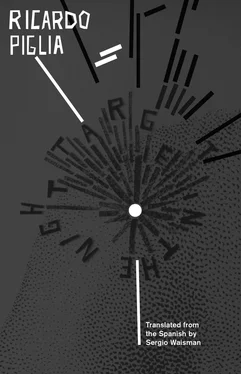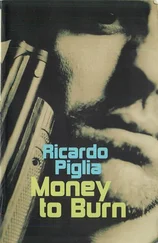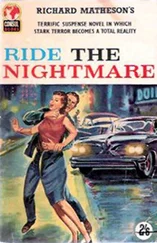Ricardo Piglia - Target in the Night
Здесь есть возможность читать онлайн «Ricardo Piglia - Target in the Night» весь текст электронной книги совершенно бесплатно (целиком полную версию без сокращений). В некоторых случаях можно слушать аудио, скачать через торрент в формате fb2 и присутствует краткое содержание. Год выпуска: 2015, Издательство: Deep Vellum, Жанр: Современная проза, на английском языке. Описание произведения, (предисловие) а так же отзывы посетителей доступны на портале библиотеки ЛибКат.
- Название:Target in the Night
- Автор:
- Издательство:Deep Vellum
- Жанр:
- Год:2015
- ISBN:нет данных
- Рейтинг книги:3 / 5. Голосов: 1
-
Избранное:Добавить в избранное
- Отзывы:
-
Ваша оценка:
- 60
- 1
- 2
- 3
- 4
- 5
Target in the Night: краткое содержание, описание и аннотация
Предлагаем к чтению аннотацию, описание, краткое содержание или предисловие (зависит от того, что написал сам автор книги «Target in the Night»). Если вы не нашли необходимую информацию о книге — напишите в комментариях, мы постараемся отыскать её.
is an intense and tragic family history reminiscent of
, in which the madness of the detective is integral to solving crimes.
, a masterpiece, won every major literary prize in the Spanish language in 2011.
Ricardo Piglia
Target in the Night — читать онлайн бесплатно полную книгу (весь текст) целиком
Ниже представлен текст книги, разбитый по страницам. Система сохранения места последней прочитанной страницы, позволяет с удобством читать онлайн бесплатно книгу «Target in the Night», без необходимости каждый раз заново искать на чём Вы остановились. Поставьте закладку, и сможете в любой момент перейти на страницу, на которой закончили чтение.
Интервал:
Закладка:
“Soon I will not have anything else to say about the past, I will be able to talk about what we will do in the future. I will climb to the top and stop living in these plains, we too will reach the highest peaks. I will live in the future tense. What is to come, what is not yet — is that enough to live on?” Luca said as he walked along the balcony above the inner courtyard.
Even though he hadn’t slept in several nights, he still recorded his dreams.
Two lost cyclists from the Doble Bragado Race turn off the road and continue on, just the two of them, far from everything, in the middle of the deserted pampas, pedaling evenly toward the south on their light Legnano and Bianchi bicycles, leaning over their handlebars against the wind.
Some time later Renzi received a letter from Rosa Echeverry with sad news. She found herself with the “painful obligation” of having to inform him that Luca “had suffered an accident.” He’d been found dead on the floor of the factory’s garage. It seemed like such a well-planned suicide that everyone could believe — if they so chose — that he’d died by falling from the height of his viewing machine, where he was taking one of his usual measurements. This is how it was explained in the letter from Rosa, for whom Luca’s last gesture was yet additional proof of his goodness and his extreme politeness.
Luca had an extraordinary sense of himself and his own integrity. Life had tested him. In the end, when he finally got what he wanted, he’d failed . Perhaps the failure — the crack — was already there and it finally gave in because he couldn’t live with the memory of his own weakness. Yoshio’s shadow, the fragile Nikkei in jail, would return to him like a ghost whenever he tried to sleep. One fleeting flash in the night is enough to break a man, as if he were made of glass.
Once the priest accepted the version of the death as an accident — because suicides, like hobos and prostitutes, were buried outside the church graveyard — Luca was buried in the cemetery. The entire town attended the ceremony.
It was raining slightly that afternoon, one of those light, freezing drizzles that go on for days and days. The cortege went down the main street, up the so-called northern slope, and as far as the large gate of the old cemetery, with the black-covered horses of the funereal carriage trotting along rhythmically and a long line of cars following behind at walking pace.
The Belladona family vault was a sober structure imitating the Italian mausoleum in Turin that contained the remains of the officers who’d fought with Colonel Belladona in the Great War. Luca had made the worked bronze door, the light webbing above the small windows, and the hinges of the vault in the family workshop when his grandfather had died. The door opened with a soft sound; it was made of a transparent, eternal material. The tombstones for Bruno Belladona, Lucio, and now Luca seemed to condense the history of the family. They’d rest together. Only the males died. Old Man Belladona stepped forward, lofty, his face wet with the rain, and stood in front of the coffin. He’d buried his father, his oldest son, and now he was burying his second son. His two daughters took their place next to him; dressed in mourning like widows, standing arm in arm. His wife, who’d only left her “lair” three times — one for each of the three deaths in the family — wore dark sunglasses and gloves, and her shoes were dirty with the mud from the cemetery grounds. Cueto observed the scene from the back, standing under a tree, in a long, white raincoat.
The ex-seminary student approached the sisters and asked permission to say a few words. Wearing all black, pale and fragile, he seemed the most appropriate person there to bid farewell to the remains of the man who’d been his mentor, and for whom he’d been a confidant.
“Death is a terrifying experience,” the ex-seminary student said. “It threatens, with its corrosive power, our possibility of living a humane life. There are two kinds of experiences that can protect those — those able to turn to them — from the terror of the danger of death. One is the certainty of truth, the continuous awakening toward the understanding of the ‘ineluctable need for truth,’ without which a good life is not possible. The other is the resolute and profound illusion that life has meaning and that the meaning of life is found in performing good deeds.”
He opened his Bible and announced that he would now read from the Gospel of John, 18:37.
“And Jesus said: For this I have come into the world, to bear witness to the truth. Every one who is of the truth hears my voice. To which Pontius Pilate answered: What is truth? Of what truth do you speak? After he said this, he turned to the judges and the priests and said: I find no crime in this man. ” Schultz looked up from the book. “Luca lived in the truth and in the search for the truth, he was not a religious man but he was a man who knew how to live religiously. The question of our time has its origins in Pilate’s answer. This question implicitly supports the sad relativism of a culture that ignores the presence of the truth. Luca lived a good life, we should say farewell to him knowing that he was enlightened by his illusions of reaching meaning through his works. He rose to the height of those illusions and gave his life to them. We should all be grateful for his persistence in the realization of his dreams and for his disdain of the false lights of the world. His work was done with the stuff that dreams are made of.”
Croce attended the ceremony but stayed in his car, without getting out, and although no one saw him, everyone knew he was there. Smoking, nervous, his hair graying, the traces of his “suspected dementia” burned in his clear eyes. Everyone eventually left the cemetery, and in the end Croce was the last one there, the murmur of the drizzle on his car’s roof and the rain falling monotonously on the road and the tombstones. When night fell on the plains and the darkness too became like the drizzle, a beam of light flashed in front of him. The circular brightness of the light pulsed back and forth, like a white ghost amid the shadows. Then, all of a sudden, it went out, and there was just the darkness.

42 “The flash of lightning that illuminated my life with a neat zigzag has been eclipsed” (Dictated to Schultz).
EPILOGUE
Many times, in different places, through the years, Emilio Renzi remembered Luca Belladona. He always remembered him as someone who’d had the courage to live up to the heights of his own illusions. Months could go by without Renzi thinking about him, and then some fortuitous event would bring him back to mind, and he’d resume the story where he’d last left it — with new clarifications and details for his friends in a café in the city, or having a few drinks at his place at night with a woman sometimes — and the images of Luca would return vividly, his frank, reddened face, his clear eyes. He remembered the empty factory, the building in the middle of the plains, Luca wandering among his instruments and his machines. Always optimistic, always finding a way to find hope, unable to imagine that reality would deal him a fatal blow, like so many others. A fall brought about by a small change in his behavior, as if he were being punished for making a mistake, not for a character flaw but for a lack of foresight, for a failing he could not forget and would return like a remorse.
That night Renzi was talking with a group of friends after dinner in an open balcony facing the river, in a weekend house in the Tigre Delta, and he felt as if that night — always in spite of himself, mocking such a natural state — he’d gone back, and that the delta was an as-of-yet unknown quadrant of reality, like that town in the country had been for him, where he’d spent a few weeks in a kind of archaic interruption of his life as a city man, unable to understand such a return to nature — even if he never stopped imagining a drastic leaving that would take him to an isolated, quiet place where he could dedicate himself to what Emilio, like Luca, also imagined was his destiny, or his vocation.
Читать дальшеИнтервал:
Закладка:
Похожие книги на «Target in the Night»
Представляем Вашему вниманию похожие книги на «Target in the Night» списком для выбора. Мы отобрали схожую по названию и смыслу литературу в надежде предоставить читателям больше вариантов отыскать новые, интересные, ещё непрочитанные произведения.
Обсуждение, отзывы о книге «Target in the Night» и просто собственные мнения читателей. Оставьте ваши комментарии, напишите, что Вы думаете о произведении, его смысле или главных героях. Укажите что конкретно понравилось, а что нет, и почему Вы так считаете.












